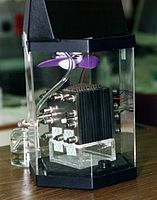
Photo from wikipedia
Electric utility regulators and policy makers implement incentive-based regulation to improve electric utilities efficiency or to manage the cost of electricity. However, poorly implemented regulation may produce undesired results such… Click to show full abstract
Electric utility regulators and policy makers implement incentive-based regulation to improve electric utilities efficiency or to manage the cost of electricity. However, poorly implemented regulation may produce undesired results such as low reliability or poor quality of service. Moreover, the competition within the electricity sector is likely to be low because of the high barriers to entry, vertically integrated electric utilities, and high capital requirements. Therefore, benchmarking exercises allow policy makers and regulators to gauge the relative efficiency of electric utilities and help them to reward or penalize the electric utilities accordingly. In this study, we examined the variables that significantly influence the efficiency of electric utilities and developed an optimum method to measure the efficiency of the electric utilities. The results of the efficiency measurement were then used to rank the electric utilities. The result of this study indicates that there are 13 variables that significantly affect the efficiency score of electric utilities and three stage virtual frontier data envelopment analysis (3S-VF-DEA) is the optimum method to measure the efficiency of the electric utilities.
Journal Title: Energies
Year Published: 2021
Link to full text (if available)
Share on Social Media: Sign Up to like & get
recommendations!